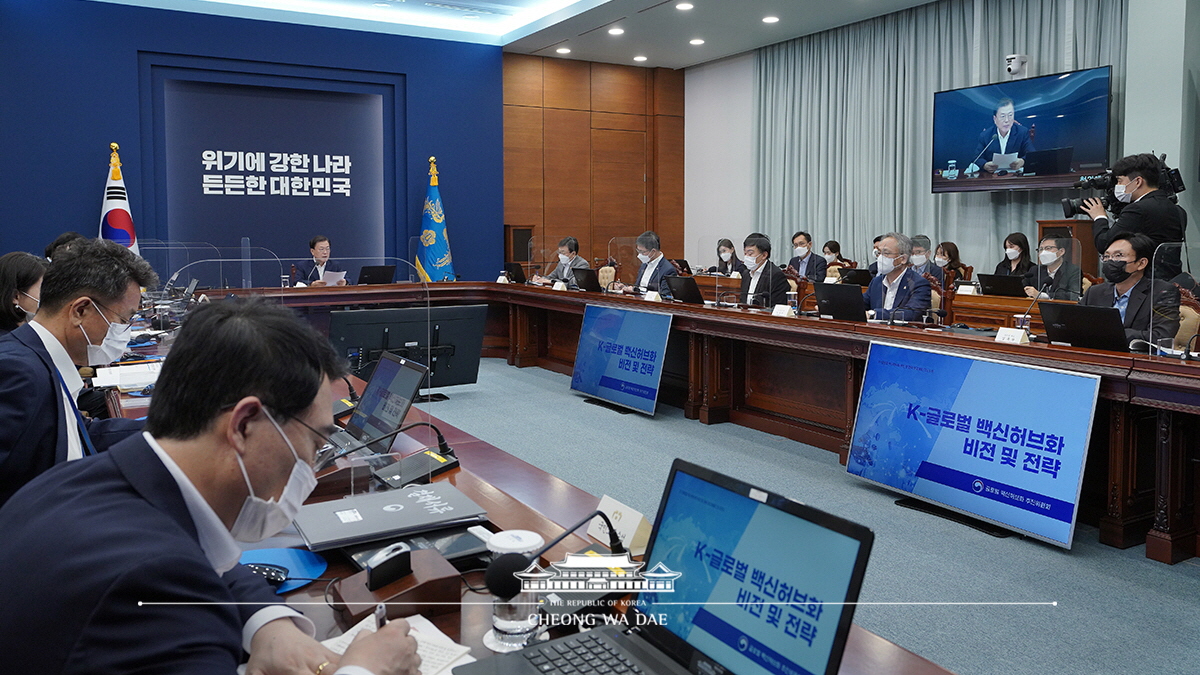이 웹사이트는 제19대 대통령 임기 종료에 따라 대통령기록관이 「대통령기록물 관리에 관한 법률」에 의해 이관받아 서비스하는 대통령기록물입니다. 자료의 열람만 가능하며 수정 · 추가 · 삭제는 불가능합니다.
다만, 「개인정보보호법」에 의하여 개인의 정보를 보호받기 원하시는 분은 관련 내용(요청자, 요청내용, 연락처, 글위치)을 대통령 웹기록물 담당자(044-211-2253)에게 요청해 주시면 신속히 검토하여 조치해 드리겠습니다. 감사합니다.
SPEECHES & REMARKS
BRIEFINGS
Remarks by President Moon Jae-in at Presentation on Korea’s Vision and Strategy for Becoming Global Vaccine Hub

Today, we are holding the first meeting of a private-public joint committee, chaired by the Prime Minister and launched to push for Korea becoming a global vaccine hub. The committee consists of government officials from relevant ministries and agencies as well as the most distinguished vaccine professionals from the private sector. At today’s meeting, we also have representatives from vaccine developing and manufacturing businesses. Thank you for joining us.
The COVID-19 situation is once more being exacerbated worldwide – now by the spread of the highly contagious Delta variant. In the seemingly endless fight against COVID-19, vaccines are the most effective means to defend ourselves. Most of the recent confirmed cases and deaths have been among those who are unvaccinated. Inoculation has significantly reduced the percentage of severely and critically ill patients and the case fatality rate. Vaccines are playing a pivotal role in protecting the lives and safety of people around the world.
However, vaccine shortages still persist worldwide, and global disparities in vaccination rates have become particularly severe – some wealthy countries are planning to give the fully vaccinated “booster shots” while many low-income countries are struggling just to complete their vaccinations before the end of next year. As such, vaccine inequality is becoming increasingly serious. Unless vaccines are distributed to all nations in sufficient quantities, there is no way to stem the ongoing emergence of variants and the spread of COVID-19. In the end, the fundamental solution to the problem is to dramatically increase the supply of vaccines.
The Republic of Korea will take the lead in solving this problem. We will strongly push a national strategy for becoming a global vaccine hub, thereby contributing to overcoming infectious disease crises that impact all of humankind. Korea has what it takes to do this. Equipped with a world-class biopharmaceutical production capacity, we are currently manufacturing and supplying four different COVID-19 vaccines that have been globally certified to be safe and effective. Our businesses are fully committed to taking on challenges to become vaccine industry leaders, and the Government is also steadfastly determined to nurture this industry.
Biohealth has become one of three new industries that will spearhead our industrial innovation; it is taking off as a flagship export industry. However, when it comes to the vaccine field, we still have a large technological gap, a heavy dependence on imports and low global market shares. Now is an opportune time for us to boldly take up the challenge of becoming a global vaccine hub. The Government, by mobilizing all available capabilities and resources, intends to contribute to humanity’s response to public health crises and vigorously foster the vaccine industry as a new growth engine for our economy. This also constitutes a way to respond to the advent of novel infectious diseases yet to come.
We will strive to ensure that Korea joins the ranks of the top five global vaccine production powerhouses by 2025. Along with semiconductors and batteries, the Government will designate vaccines as one of three national strategic technologies and is planning to inject 2.2 trillion won over the coming five years. Tax benefits for R&D and facility investments will be significantly expanded. In addition, we will become self-sufficient with regard to technology and the production of essential materials, parts and equipment, thereby paving the way for domestic firms to maximize their production capabilities.
Creating a vaccine industry ecosystem is also crucial. We will make efforts to foster biopharmaceutical industry professionals, including more than 200 medical scientists, about 10,000 clinical trial experts and 2,000 production specialists annually. We will establish a K-Bio Lab Hub and provide various incentives by designating high-tech investment zones.
We will further strengthen the global cooperation system as well. While working closely together with the United States to ensure that the global vaccine partnership agreed upon at the Korea-U.S. summit leads to substantive results, we will expand our vaccine partnerships with Germany, the United Kingdom and other countries. Communication and cooperation with such international organizations as the WHO, global vaccine research institutes and manufacturing companies will also be enhanced. Boosting foreign investments and attracting multinational companies are examples of how we will lay the foundation for Korea’s emergence as a global vaccine hub.
Developing homegrown vaccines swiftly is also of paramount importance to secure vaccine sovereignty. A COVID-19 vaccine developed by a domestic firm is scheduled to enter its Phase 3 clinical trial this month, and this first homegrown vaccine should be on the market before the first half of next year is over. The development of next-generation mRNA vaccines is also picking up speed. Localized development of key production technologies is now underway, and it is looking more likely that the resultant vaccines will go into clinical trials within this year. The Government will subsidize the costs of clinical trials to speed up the development of homegrown vaccines and put various support systems in place, including those for localized production of raw and processed materials and for patent analysis. I urge the committee members to commit themselves to homegrown vaccine development by ensuring that mRNA vaccines are developed as well this time – even if they come late.
The Republic of Korea has undergone numerous crises, but it has demonstrated a remarkable power to turn each one into an opportunity. Our country is fully exhibiting this power even amid the COVID-19 crisis. Now, taking it a step further, let’s create an opportunity for Korea to emerge as a leading vaccine country while playing a pivotal role as a global vaccine hub that helps humankind overcome infectious diseases.
Thank you.



